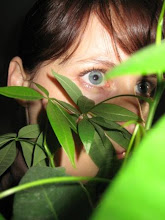Recently, I find that I’ve been quite a lot of thought to the concept of “aging.” This is common – I believe – for someone of my age. I am an adult with adult parents who have elderly parents. When confronted with the generations of genetic influence, it would be nearly impossible to avoid noticing the advancement of time and the effect that it has.
The dramatic effects of aging are perhaps most startling in my Grandmother C, from my father’s side. This is most likely a direct result of the dramatic contrast of her life now, compared to her life “then.” She has always been an incredibly independent woman, living without a husband for the length of my personal memories. In the past couple of years, her health has weakened. Last year she suffered a major stroke, and now – in her early 90s – she resides in a nursing home.
The loss of control has been a heavy blow to my grandmother, who – in her previous life - never answered to anyone. There is no “light at the end” of the tunnel that she now travels and – like many who find themselves in nursing homes – she has settled into a depression that is relieved only when momentarily displaced by desperation. This desperation generally takes the form of “wanting out.” Her children, including my father, do their best to oblige. As often as they can, they take her out to lunch; out to dinner; out for a visit; etc. This is how it came about that Grandma came for a visit the last time I visited my parents.
Last week, J and I traveled to Sparta to help my father in his apple orchard. My father’s plan was to bring Grandma out in the morning: I could “visit” (“monitor”) her while sorting apples in the garage. Modification of the plan was necessary when it was discovered that my Uncle W had taken Grandma for the morning, but he agreed to bring her to the house rather than back to the nursing home. The two arrived mid-morning; Grandma tiny and swathed in five sweaters to ward off the chilly 80-degree weather.
Grandma was seated in a chair inside the garage. When seated, her short stature combined with the chair location to give her a lovely view of either a) the John Deere Gator or b) our feet. She morosely pondered both. Noticing this, I offered to relocate her, but she was reticent. It appears to be a genetic quality, this refusal to better conditions in small ways if one is unhappy with the larger condition. I’ve noticed the predilection for it in myself but – fortunately – work to overcome it. Grandma had no such inclination.
For some time, we worked with the apples while Grandma – for the most part – ignored the activities. Things continued along these lines until my father took it upon himself to leave the garage in order to go make lunch. This was disturbing for my grandmother. In a quivery voice, she asked if he had “left her.” I had to bend over to hear her each time she spoke. No, I assured her, he had merely gone inside to make some lunch. Was she hungry? I asked. She glumly settled her head into her hands, indicating with a head shake that she was not. A few moments later, she asked again about his whereabouts. Once again, I reminded her that he was preparing lunch. Did she need to go inside? I asked. She threw herself as deeply into the chair as she could (this was – actually – not very far) and, with obvious frustration, stated that she didn’t know what “she was supposed to do.” It was clear that this statement reflected more than a simple walk over to the house.
Moments later, she gazed in the direction of the garage door. “I wish I knew where David went…” she declared mournfully, in her small voice.
The entire experience was both sad and amusing. Sad because we were bearing witness to an undeniable decline, amusing because we needed it to be. How else could we mentally handle such evidence of our own mortality? It truly is amazing how the end of our lives replicate the beginnings, how our needs increase as quickly as our abilities fade. It is becoming more and more clear to me that the most important thing in life is who you choose to live it with. Gazing at my grandmother, I know that – should I be fortunate enough to live as long as she – I want to be surrounded by people who can remember what I was/am inside, and I want that remembrance to be powerful enough to translate into their loving treatment of me when I am dependent upon them.
For now, for my grandmother, I am limited in what I can do. We must each prepare ourselves for our eventual decline on our own; must each decide how we will accept the inevitable. Observing my grandmother has taught me this: When someone you care for is struggling, when they have reached a point that their needs will forevermore exceed their capabilities, it is a consolation to be able to “do” for them, to be able to ease their burden – even in small ways. That is a gift that I will give to others. When it is my time, I will accept the offerings of my loved ones. The acceptance of their care, of their affection, will be a testament to the value that I place on them.
If anyone – however – seats me in chair behind a John Deere Gator, leaving me trapped behind the garish green and yellow monstrosity, there will be HELL to pay.
Subscribe to:
Post Comments (Atom)

No comments:
Post a Comment